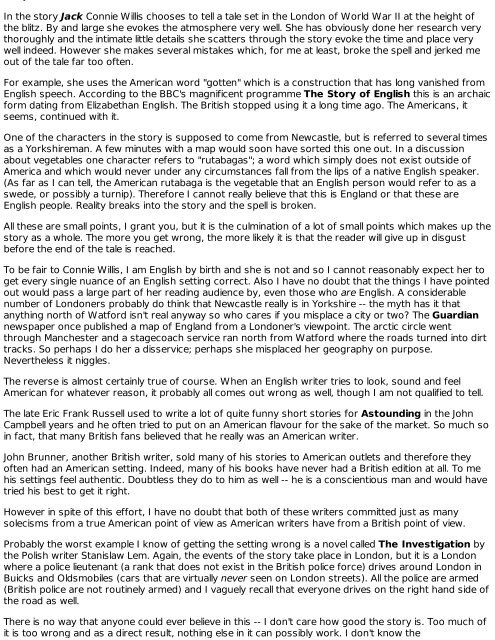Triffids Beard 2 - The Bearded Triffid
Triffids Beard 2 - The Bearded Triffid
Triffids Beard 2 - The Bearded Triffid
You also want an ePaper? Increase the reach of your titles
YUMPU automatically turns print PDFs into web optimized ePapers that Google loves.
In the story Jack Connie Willis chooses to tell a tale set in the London of World War II at the height of<br />
the blitz. By and large she evokes the atmosphere very well. She has obviously done her research very<br />
thoroughly and the intimate little details she scatters through the story evoke the time and place very<br />
well indeed. However she makes several mistakes which, for me at least, broke the spell and jerked me<br />
out of the tale far too often.<br />
For example, she uses the American word "gotten" which is a construction that has long vanished from<br />
English speech. According to the BBC's magnificent programme <strong>The</strong> Story of English this is an archaic<br />
form dating from Elizabethan English. <strong>The</strong> British stopped using it a long time ago. <strong>The</strong> Americans, it<br />
seems, continued with it.<br />
One of the characters in the story is supposed to come from Newcastle, but is referred to several times<br />
as a Yorkshireman. A few minutes with a map would soon have sorted this one out. In a discussion<br />
about vegetables one character refers to "rutabagas"; a word which simply does not exist outside of<br />
America and which would never under any circumstances fall from the lips of a native English speaker.<br />
(As far as I can tell, the American rutabaga is the vegetable that an English person would refer to as a<br />
swede, or possibly a turnip). <strong>The</strong>refore I cannot really believe that this is England or that these are<br />
English people. Reality breaks into the story and the spell is broken.<br />
All these are small points, I grant you, but it is the culmination of a lot of small points which makes up the<br />
story as a whole. <strong>The</strong> more you get wrong, the more likely it is that the reader will give up in disgust<br />
before the end of the tale is reached.<br />
To be fair to Connie Willis, I am English by birth and she is not and so I cannot reasonably expect her to<br />
get every single nuance of an English setting correct. Also I have no doubt that the things I have pointed<br />
out would pass a large part of her reading audience by, even those who are English. A considerable<br />
number of Londoners probably do think that Newcastle really is in Yorkshire -- the myth has it that<br />
anything north of Watford isn't real anyway so who cares if you misplace a city or two? <strong>The</strong> Guardian<br />
newspaper once published a map of England from a Londoner's viewpoint. <strong>The</strong> arctic circle went<br />
through Manchester and a stagecoach service ran north from Watford where the roads turned into dirt<br />
tracks. So perhaps I do her a disservice; perhaps she misplaced her geography on purpose.<br />
Nevertheless it niggles.<br />
<strong>The</strong> reverse is almost certainly true of course. When an English writer tries to look, sound and feel<br />
American for whatever reason, it probably all comes out wrong as well, though I am not qualified to tell.<br />
<strong>The</strong> late Eric Frank Russell used to write a lot of quite funny short stories for Astounding in the John<br />
Campbell years and he often tried to put on an American flavour for the sake of the market. So much so<br />
in fact, that many British fans believed that he really was an American writer.<br />
John Brunner, another British writer, sold many of his stories to American outlets and therefore they<br />
often had an American setting. Indeed, many of his books have never had a British edition at all. To me<br />
his settings feel authentic. Doubtless they do to him as well -- he is a conscientious man and would have<br />
tried his best to get it right.<br />
However in spite of this effort, I have no doubt that both of these writers committed just as many<br />
solecisms from a true American point of view as American writers have from a British point of view.<br />
Probably the worst example I know of getting the setting wrong is a novel called <strong>The</strong> Investigation by<br />
the Polish writer Stanislaw Lem. Again, the events of the story take place in London, but it is a London<br />
where a police lieutenant (a rank that does not exist in the British police force) drives around London in<br />
Buicks and Oldsmobiles (cars that are virtually never seen on London streets). All the police are armed<br />
(British police are not routinely armed) and I vaguely recall that everyone drives on the right hand side of<br />
the road as well.<br />
<strong>The</strong>re is no way that anyone could ever believe in this -- I don't care how good the story is. Too much of<br />
it is too wrong and as a direct result, nothing else in it can possibly work. I don't know the


